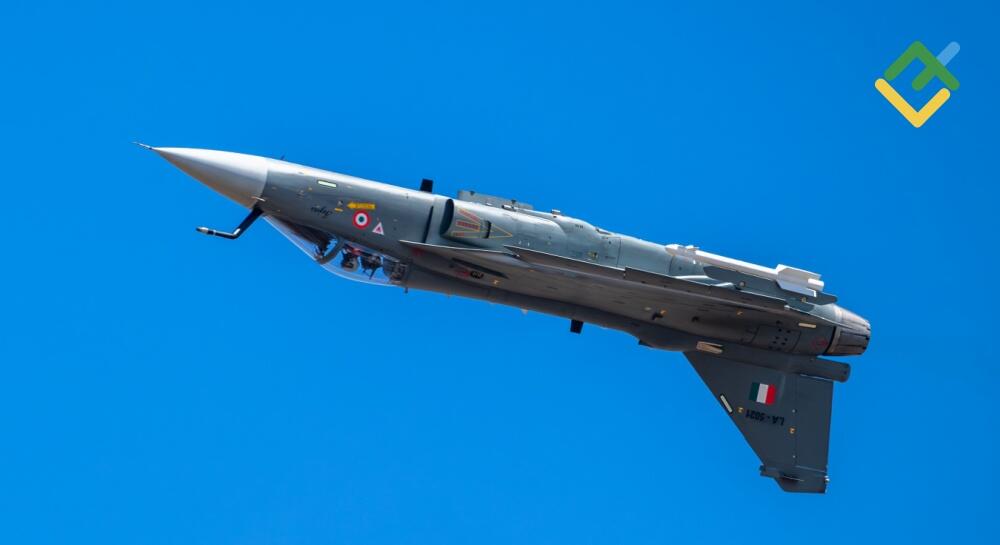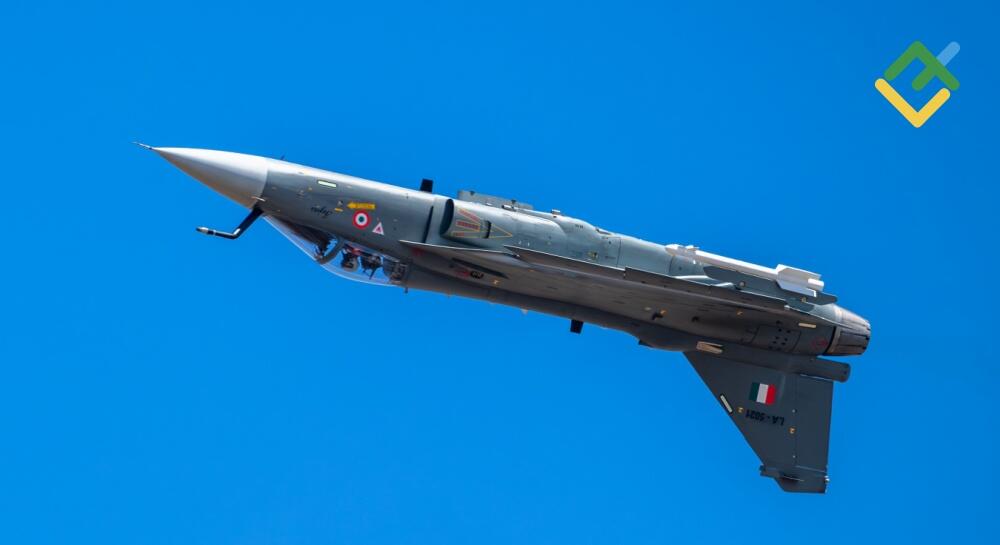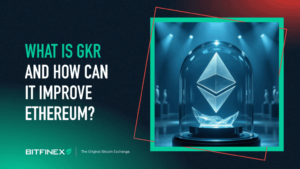Best Aerospace and Defense Stocks to Buy in 2025

Over the past five years, the best aerospace and defense stocks have delivered returns of over 1,000%. This surge is driven not only by rising geopolitical tensions but also by advances in artificial intelligence, which have propelled defense and space technologies to new heights.
Nevertheless, the tendency to resolve conflicts by military means and the increase in defense spending continue, as evidenced by recent military clashes. Therefore, the bullish trend in the best aerospace and defense stocks will likely persist over the next 1–2 years.
The article covers the following subjects:
Major Takeaways
- Aerospace and defense stocks are shares of companies that design, produce, and market aircraft, rockets, satellites, weapons, and military equipment. Many also develop engines, advanced sensors, and AI-driven autonomous systems. These technologies are often supplied by some of the largest defense contractors, such as Raytheon Technologies and United Technologies, which have been consistently awarded major government contracts.
- Some leading aerospace and defense companies are blue chips.
- Defense spending by countries not directly involved in military conflicts remains a major growth driver. For instance, the war between Russia and Ukraine sparked a sharp rise in European defense stocks, while US companies posted more moderate gains.
- Military and space stocks Rheinmetall and Rolls-Royce Holdings recorded the biggest five-year gains, climbing 2,604.14% and 2,130.28%, respectively. Rheinmetall’s surge was driven by higher defense spending and arms supplies to Ukraine, while Rolls-Royce benefited from rising demand for engines and growing interest in small modular reactors.
- Aerospace and defense stocks pay dividends rarely, as most of their cash flow is reinvested into research, development, and production to maintain competitiveness. The annual dividend yield of major stocks barely reaches 1.5%.
What Are Aerospace and Defense Stocks?
Aerospace and defense stocks are securities of companies related to the following businesses:
- Space technology and launch vehicle manufacturing.
- Aviation industry: development and production of civil and military aircraft.
- Engineering and supplying various weapons systems, such as small arms, artillery, missiles, armored vehicles, military aircraft, ships, tanks, submarines, and other defense or shipbuilding equipment.
- Developing and supplying engines, mechanical assemblies, and electronics for military and aerospace applications.
- Development of automated control and electronic systems, including those utilizing artificial intelligence, as well as radars, security systems, and related technologies.
Major defense and aerospace companies often operate in both sectors, leveraging shared technologies and expertise that apply across the two fields.
Best Aerospace and Defense Stocks for 2025
Lockheed Martin, the largest defense and aerospace company in the US and worldwide by revenue and government contracts, is absent from the list due to its underwhelming performance. Its stock has fallen 17% over the past year and risen only 24% over the last five years, exhibiting notable volatility. Additionally, companies from the next section, whose shares have soared over tenfold, were also excluded, as their growth was primarily fueled by the war in Ukraine. Therefore, they are gathered in a separate section.
This section features the best defense and aerospace stocks based on the following criteria:
- High 1-year and 5-year returns.
- Diversified business: a company operates in both the aerospace and defense sectors.
- Large market capitalization and steady flow of government contracts (preferable but not crucial).
Be cautious. Companies that have surged in a short time can just as quickly give back those gains, since every conflict eventually runs its course. Still, another one could break out at any time.
Rolls-Royce Holdings (RR)
Rolls-Royce Holdings is a multi-industry engineering and technology company with a diverse portfolio spanning aviation, defense, marine, and energy sectors. The company is benefiting from strong demand for jet engines, a rebound in engine maintenance services after the pandemic, and growing investor interest in its small modular reactor (SMR) technology.
Country: UK.
Capitalization: £98.25 billion.
1-Year Return: +125.62%.
5-Year Return: +2,130.28%.
Annual dividend yield: 0.64% or £7.48 per share.
Key business areas:
- Aero engine manufacturing and maintenance for commercial aircraft and business jets.
- Engines and power units for military aviation. Equipment and integrated solutions for emergency power systems for engines used in ground transport and marine vessels.
- Small modular reactors (SMR) and electric/hybrid power supply systems.
Airbus SE (AIR)
Airbus SE is Europe’s largest aerospace and defense company, operating across commercial aircraft, defense and space systems, as well as helicopter manufacturing. Around two-thirds of its revenue comes from Europe and Asia-Pacific, while North America accounts for about 20%. Its notable products include the Airbus A380, the world’s largest passenger aircraft, innovative air taxi concepts, and the LOOP multi-purpose orbital module, designed as a potential successor to the International Space Station.
Country: Netherlands.
Capitalization: €104.43 billion.
1-Year Return: +46.26%.
5-Year Return: +154.19%.
Annual dividend yield: 0.87% or €1.72 per share.
Key business areas:
- Designing, manufacturing, and supplying the A220, A320, A330, and A350 passenger aircraft.
- Military transport aircraft, communications and reconnaissance systems, and satellites.
- Civil and military helicopter manufacturing.
RTX Corporation (RTX)
RTX Corporation, formerly Raytheon Technologies Corporation, is a multinational company operating in the aerospace and defense technology sector. Its stock price is bolstered by government orders related to the modernization of military equipment and its technological upgrade. Older equipment is transferred to other countries, and new-generation systems are introduced in its place. For example, the company has received a contract for drones powered by artificial intelligence.
Country: US.
Capitalization: $218.65 billion.
1-Year Return: +35.68%.
5-Year Return: +184.14%.
Annual dividend yield: 1.67% or $2.72 per share.
Key business areas:
- Development, production, and maintenance of aircraft engines and auxiliary power systems.
- Development of avionics systems, onboard electronic and mechanical components, and control systems for aircraft (commercial, military, and hybrid).
- defense equipment manufacturing. Missile systems, anti-missile defense systems, radars, reconnaissance and cyber security systems.
Safran (SAF)
Safran is an international technology and aerospace conglomerate. The French government owns just over 12% of the company, employees own around 10%, and the remaining shares are publicly traded. Together with Airbus, the company is developing space rocket projects.
Country: France.
Capitalization: €125.83 billion.
1-Year Return: +38.71%.
5-Year Return: +247.34%.
Annual dividend yield: 0.98% or €2.90 per share.
Key business areas:
- Development, production, maintenance, and modernization of engines for commercial and military aircraft, propulsion systems for satellites, and rocket engines.
- Manufacturing of aviation components and systems: landing gear, brakes, control systems, navigation systems, electronic defense and reconnaissance systems.
- Production of aircraft components and accessories: cabins, seats, cabin equipment, interior systems, etc.
- Laser-based anti-drone systems development.
General Dynamics (GD)
General Dynamics is one of the leading US corporations in the aerospace and defense sector. Its key products include Gulfstream business jets, the F-16 Fighting Falcon fighter jet, and the M1 Abrams tank.
Country: US.
Capitalization: $88.86 billion.
1-Year Return: +10.07%.
5-Year Return: +139.01%.
Annual dividend yield: 1.82% or $6.00 per share.
Key business areas:
- Manufacture and maintenance of private jet aircraft.
- Development and construction of surface combat ships, auxiliary vessels, and nuclear submarines.
- Manufacture of tanks, armored personnel carriers, ammunition, and weapon systems.
- Creating Information technology solutions: communication, surveillance, and data collection systems, as well as software solutions.
Stocks That Rise During War and Geopolitical Tensions
The period from 2022 to 2025 showed that shares of defense contractors and aerospace companies in nations not directly involved in conflicts have performed the best. The most substantial gains were recorded not in countries far removed from the fighting and offering only advice but in those bordering war zones. These nations supply weapons and ramp up their own defense readiness, driving investor demand for military and aerospace stocks.
Neutral countries such as Australia and Japan are not part of this group, although Japan does have several promising defense companies. Latin America, meanwhile, has almost no domestic defense technology base. As a result, the most logical areas of focus are Europe, the US, and China, particularly in the event of a conflict over Taiwan.
Rheinmetall (RHMG)
Rheinmetall is an integrated technology group focused on the production of weapons and defense equipment. The company’s notable projects include the Leopard 2, Lynx, Marder, Boxer, Fuchs, anti-aircraft systems Gepard, and Skynex. Growth factors include demand for military equipment and ammunition due to the war in Ukraine and increased investment in defense by European countries and NATO.
Country: Germany.
Capitalization: €89.84 billion.
1-Year Return: +306.49%.
5-Year Return: +2,604.14%.
Annual dividend yield: 0.41% or €8.08 per share.
Key business areas:
- Production of tracked and wheeled armoured combat vehicles, ammunition, artillery, air defense systems, electronic control and reconnaissance systems.
- Manufacture of spare parts for defense equipment.
- Production of large- and medium-calibre weapons, ammunition, and explosives.
- Manufacture of radars and military electronic equipment.
BAE Systems (BAES)
BAE Systems is an international company specializing in defense and space technologies, as well as security solutions.
Country: UK.
Capitalization: £59.48 billion.
1-Year Return: +62.64%.
5-Year Return: +309.23%.
Annual dividend yield: 1.72% or £34.16 per share.
Key business areas:
- defense equipment and weapons: combat vehicles, tanks, artillery, armored vehicles, ammunition, weapon systems.
- Development of military aircraft (Eurofighter Typhoon, F-35) in collaboration with Airbus and Leonardo.
- Construction and maintenance of warships, submarines, and maritime defense systems.
- Digital, cyber, and intelligent solutions: management, intelligence, and cybersecurity systems.
Saab AB (SAAB B)
Saab AB is a Swedish company specializing in defense, aerospace, and security systems. It has its own shipyard where submarines and combat boats are designed and built. Rising defense budgets in European and NATO countries have driven its share price up over the past year.
Country: Sweden.
Capitalization: 302.69 billion SEK.
1-Year Return: +164.21%.
5-Year Return: +788.13%.
Annual dividend yield: 0.35% or 1.96 SEK per share.
Key business areas:
- Development and construction of aircraft and unmanned aerial vehicles.
- Military and defense sector: missiles, ammunition, and combat systems for land-, sea-, and submarine-based platforms.
- Radar and early warning system development.
Mitsubishi Heavy Industries (7011)
Mitsubishi Heavy Industries is an engineering and technology corporation operating in the energy, infrastructure, aviation, aerospace, and defense sectors. Global geopolitical instability underpins its growth.
The company has signed a contract with Australia to build naval frigates. It has also concluded a contract with French companies to supply missile weapons. Moreover, the company has government orders from Japan.
Country: Japan.
Capitalization: ¥13.8 trillion.
1-Year Return: +75.89%.
5-Year Return: +1,499.92%.
Annual dividend yield: 0.60% or ¥23.08 per share.
Key business areas:
- Electronic systems for aircraft, launch vehicles, and spacecraft; participation in spacecraft launch services; defense equipment and weapon systems production.
- Gas and steam turbine manufacturing.
- Development of transportation systems, including lifting and material-handling equipment, and industrial machinery.
- Construction of ships, offshore platforms, and ship repair.
- Nuclear power systems, nuclear fuel production.
Leonardo (LDO)
Leonardo is an engineering holding specializing in aerospace, defense, and security solutions. Approximately 30% of its shares are owned by the state. Its most notable products include the Eurofighter Typhoon and other jointly developed combat aircraft.
Country: Italy.
Capitalization: €30.62 billion.
1-Year Return: +159.68%.
5-Year Return: +962.12%.
Annual dividend yield: 0.99% or €0.52 per share.
Key business areas:
- Development and production of aviation equipment and components.
- defense electronics and security: radars, communication and reconnaissance systems.
- Design and manufacture of weapon systems: artillery, naval systems, and navigation/strike technologies.
- The company is involved in the development, launch, and servicing of navigation and telecommunications satellites through joint ventures.
- Development of unmanned systems and robotic technologies, including autonomous platforms for air, land, and maritime operations.
How to Invest in Aerospace and Defense Stocks
Let’s explore in more detail how to invest in military stocks:
-
Investing through a CFD broker is one of the simplest ways to gain exposure to military stocks. This trading strategy allows you to start with a small investment or practice for free on a demo account. When trading CFDs, you do not actually own the underlying shares. Instead, you profit from the difference between the buying and selling prices.
For example, you can buy Lockheed Martin (LMT) shares in a few clicks through the LiteFinance broker. You can register in just 1–2 minutes, since no verification is needed to trade on a demo account. To start live trading, simply complete the verification process. The minimum deposit required is $50.
- If you invest through a stockbroker, you will need access to European or US stock exchanges. This method allows you to purchase real shares in any company for long-term investment. However, the minimum entry amount is relatively high, and non-residents may face verification issues.
- You can invest in ETFs managed by professionals. Examples of funds investing in the aerospace and defense industries include the Invesco Aerospace & Defense ETF (PPA), the SPDR S&P Aerospace & Defense ETF (XAR), and the Shares US Aerospace & Defense ETF (ITA).
The first two options involve independent investing, which requires regular portfolio monitoring. You need to track performance and rebalance your holdings as needed. The third option is a form of passive investing that does not require in-depth market analysis — a basic overview is usually sufficient.
Conclusion
The returns on shares of some space and military companies are outperforming the technology sector (NASDAQ index companies). However, this sharp surge has only been observed in the last 2–4 years. The Ukraine-Russia conflict, tensions between nuclear-armed Pakistan and India, and uncertainty between the US and China over Taiwan are pushing the world’s leading countries to increase their military budgets.
European defense companies have been among the top performers in recent years. However, over the long term, it is worth paying attention to companies in the US, Japan, and China that operate across both the aerospace and defense sectors.
Global leadership does not always translate into higher returns for investors. In recent years, Rheinmetall and Saab AB have outperformed the global market leader, Lockheed Martin, in the defense sector, while Airbus has shown stronger results in the aerospace industry.
Besides, it is not always reasonable to focus on a specific country. For instance, Japanese Mitsubishi has orders from Australia and France. Technology and geopolitical tensions in Europe have boosted its growth by 1000% in two years.
It is unclear whether defense and space stocks have exhausted their potential after their rally. However, there are no signs of global peace on the horizon. Therefore, adding a few defense stocks to your investment portfolio still makes sense.
Are aerospace and defense stocks a good investment?
The content of this article reflects the author’s opinion and does not necessarily reflect the official position of LiteFinance broker. The material published on this page is provided for informational purposes only and should not be considered as the provision of investment advice for the purposes of Directive 2014/65/EU.
According to copyright law, this article is considered intellectual property, which includes a prohibition on copying and distributing it without consent.






